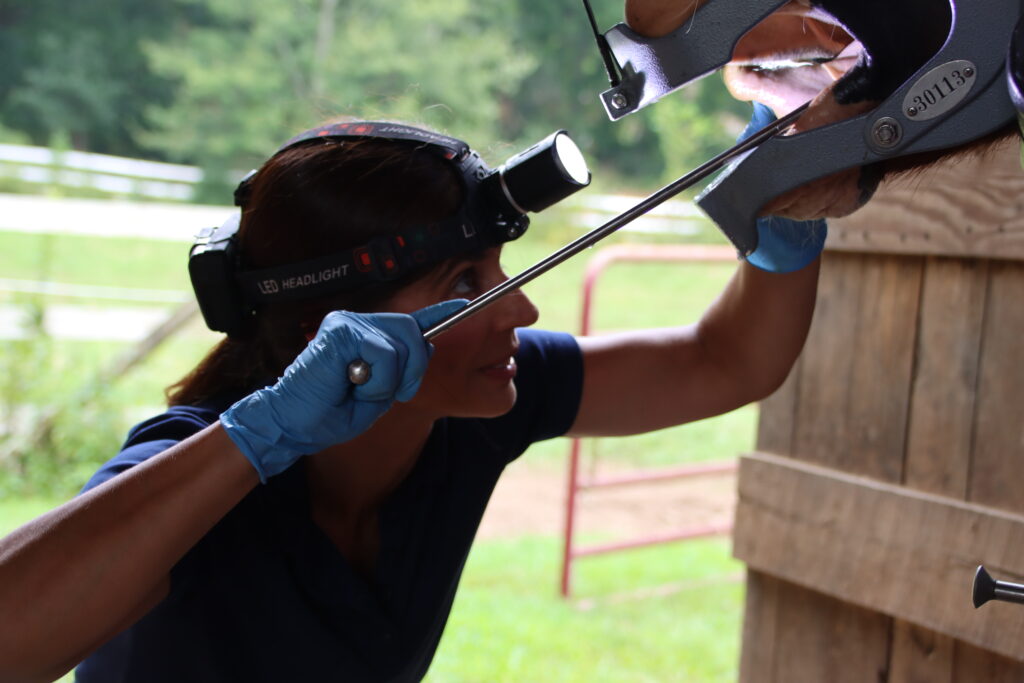Equine Dentistry
When looking for an equine dentist in the Amston, Connecticut area, look no further than Connecticut Equine Clinic.
Our veterinarians offer thorough dental examinations and treatment for horses. Equine dentistry is the care of healthy teeth as well as the treatment of unhealthy teeth. It involves the use of floats, either mechanical or power rasps to file down the teeth.
The health of the oral cavity, though often overlooked, is essential to the comfort and performance of your horse.
Sharp enamel points can lead to bruising, ulcerations and lacerations of the tongue and cheeks. Routine oral evaluation and enamel point reduction are essential to prevent more serious issues such as sinus infection and tooth root abscesses which may require more invasive medical and surgical care and could leave your horse on the sidelines for extended periods of time. The use of sedation and an oral speculum allow for a complete oral examination to be performed and proper diagnosis of dental disease.

Foals and yearlings should be evaluated for incisor abnormalities (over or under bite) or any facial trauma.
Otherwise, horses should be checked by the time they are 2 years of age or at least 30 days prior to training. Dental problems can affect the way the horse react to a bit and may create bad habits that are difficult to correct at a later time. Early diagnosis and correction of many dental problems can save the horse years of pain and greatly extend the life of the teeth, not to mention a much more productive and less expensive training experience. Adult horses should have their teeth checked every 6 to 12 months, depending on their age and dental health.
A horse’s teeth continue to erupt until the age of 25 to 30.
On their natural diet of grass, the horse’s teeth grind in a circular pattern and this process wears down the teeth. The action of reaching down to graze and then raising the head to chew changes the jaw position. The horse’s upper molars are spaced farther apart than the lower ones, which makes for efficient grinding of grass. When a horse has a diet of grain and hay, there is less fiber in their diet and the tooth surfaces are not ground down. When these surfaces become uneven, the horse cannot move his jaw sideways and then the teeth become even more uneven. Eventually, there are sharp points in the horse’s mouth, making chewing a painful experience.
The following concerns can be related to issues involving the horses’ teeth. If your horse exhibits any of these symptoms, you should have the horse dentists at Connecticut Equine Clinic examine your horse’s mouth:
- Loss of weight
- Dropping feed
- Whole grain in manure
- Tilting head while chewing
- Head tossing – resisting the bit
- Bleeding gums
- Choking
- Swelling on face or jaw
- Bad odor from mouth or nose
- Making strange faces
- Resisting forward movement
- Difficulty turning
- Refusing jumps
- Rearing
Dental care should be a part of every horse’s regular health maintenance routine, regardless of age or appearance.
Many horses go through life without any major dental issues. However, many of the worst dental conditions are discovered in stoic horses in good weight showing no clinical signs of tooth-related issues. On the other hand, just because a horse is thin does not necessarily mean that it has a problem with its teeth. Our veterinarians can help determine if your horse needs dental floating or treatment.
Equine dentistry is crucial for maintaining a happy and healthy horse.
The veterinarians at Connecticut Equine Clinic strive to provide the highest level of dental and wellness care for all of our patients and satisfaction for our clients through professionalism and compassion. You can expect a wealth of knowledge, experience and passion from Connecticut Equine Clinic in Amston, Connecticut.
Contact Us